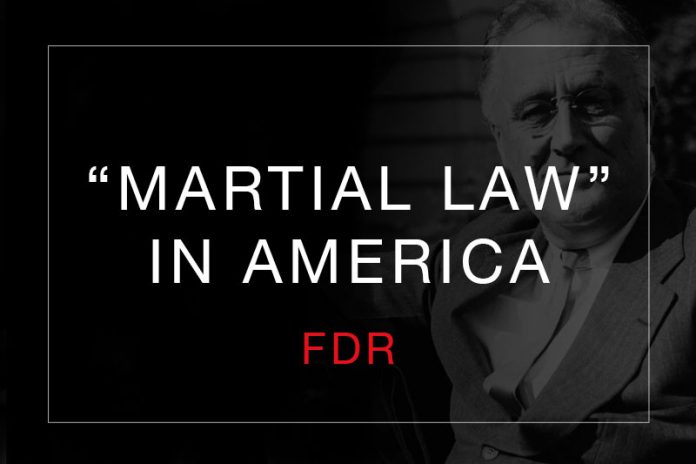Last Updated on February 17, 2022 by Constitutional Militia
Indefinite Detentions
As to how extensively the perverse practice of indefinite detention might be applied in the future, the background of Korematsu v. U.S. provides a chilling possibility. On 19 February 1942, President Franklin D. Roosevelt purported to authorize the Secretary of War “to prescribe military areas in such places and of such extent as he or the appropriate Military Commander may determine” within the United States.
Source: Executive Order No. 9066 (19 February 1942), 7 Federal Register 1407, 1407 (25 February 1942) (emphasis supplied)
“Martial Law” Under President
No vivid imagination is necessary to foresee how some future rogue President and his lackeys in Congress, using President Franklin Roosevelt’s Executive Order No. 9066, of 19 February 1942 as their model, could substitute for “the war [against Germany and Japan]” with “the war on terrorism”. In 1944, the Supreme Court in Korematsu v. U.S. upheld the order for exclusion, on the ground that “exclusion of those of Japanese origin was deemed necessary because of the presence of an unascertained number of disloyal members of the group, most of whom we have no doubt were loyal to this country”, and the “judgment that exclusion of the whole group was * * * a military imperative”.[1] Some forty-six years after Roosevelt’s Executive Order for the indefinite detentions of Japanese Americans on American soil, Congress recognized the crime. Thus proving the prescience of Justice Robert Jackson’s ominous warning when the Supreme Court upheld the internment of innocent Japanese-Americans, that
“once a judicial opinion rationalizes [a governmental act] to show that it conforms to the Constitution, or rather rationalizes the Constitution to show that the Constitution sanctions such an [act], the Court * * * has validated the principle. * * * The principle then lies about like a loaded weapon ready for the hand of any authority that can bring forward a plausible claim of an urgent need. Every repetition imbeds the principle more deeply in our law and thinking and expands it to new purposes. * * * There it has a generative power of its own, and all that it creates will be in its own image.”[2]
In their review of the Nazis’ “PURGE OF POLITICAL OPPONENTS AND TERRORIZATION”, the prosecutors at Nuremberg charged (and proved) that “[w]ithout judicial process, the Nazi conspirators imprisoned, held in protective custody and sent to concentration camps opponents and suspected opponents” and “authorized the Gestapo to arrest and detain without recourse to any legal proceeding.”[3] “[T]he fear of such camps was a very effective brake on any possible opposition.”[4] Those who will not learn from this history where the contemporary reintroduction of indefinite detention is leading America will be condemned to relive the lesson to its bitter end.[5]





























